Economic Equality Caucus
which advocates for economic equality across the USA.
| Home | Organizational Structure | State Coordinators | Executive Director | Caucus Articles | Memberships | |||||
| "Delta Vision, Delta Voices" | ||||||||||
|
Help Advocate for Economic Progress and Equality. Donate to the Delta Caucus/Economic Equality Caucus. |
||||||||||
Delta Grassroots Caucus Events

Credit Michael Hibblen/ KUAR News, Arkansas Public Radio; Former President Bill Clinton speaking to the Delta Grassroots Caucus on May 2, 2013, at the University of Arkansas Clinton School of Public Service, Little Rock
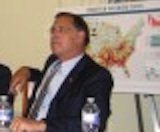
U. S. Senator John Boozman, Arkansas, at a Delta Grassroots Caucus meeting at the US Capitol
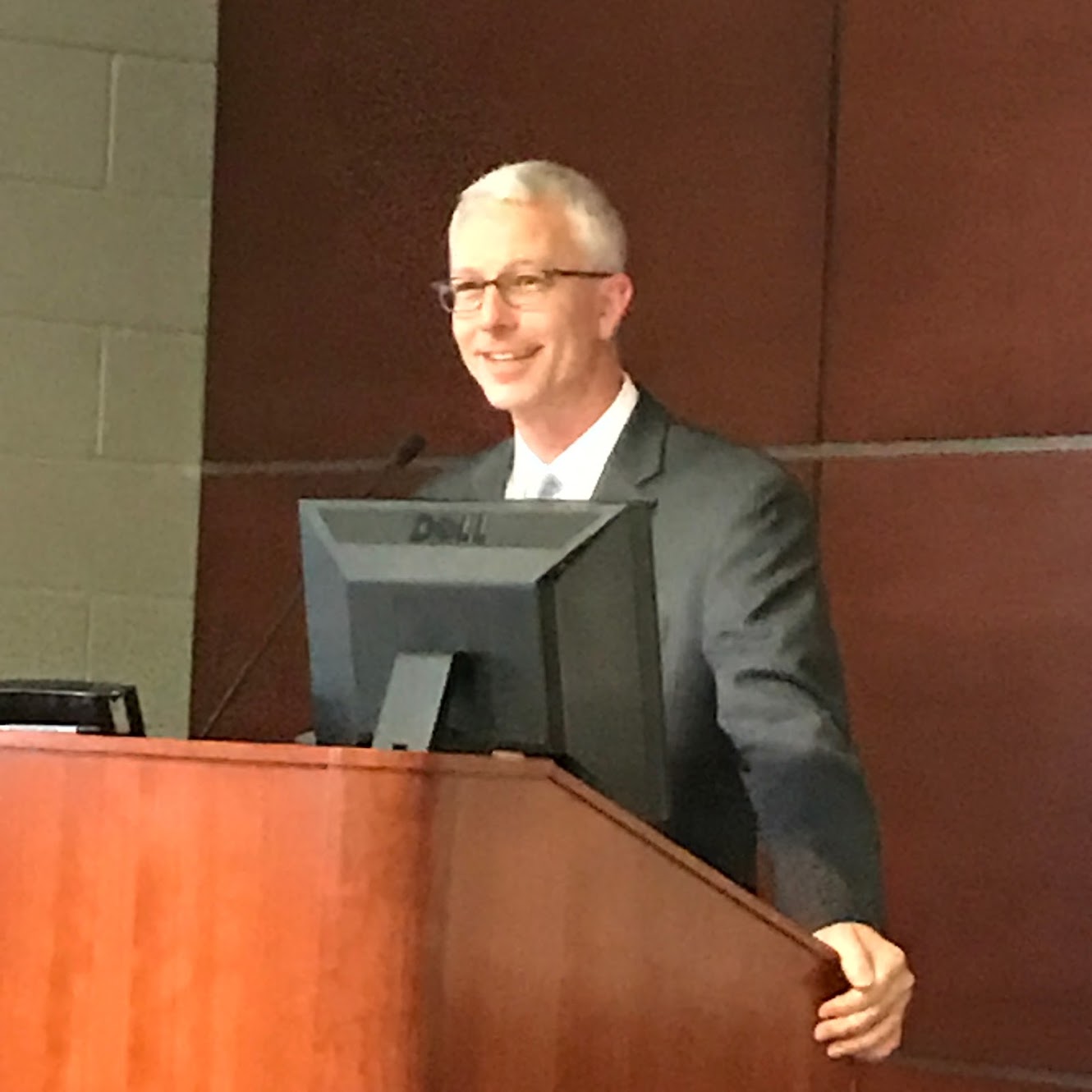
Brad Cole, Executive Director of the Municipal League of Illinois; previously a senior aide to former Republican US Sen. Mark Kirk of Illinois, earlier Mayor of Carbondale, Illinois, veteran Delta regional advocate, speaking at the Delta regional conference in West Memphis, Arkansas on April 26, 2019.

President Bill Clinton makes a comment to Delta Caucus Director Lee Powell at a meeting in Blytheville, Arkansas (in the northeast Arkansas Delta) on Nov. 2, 2014
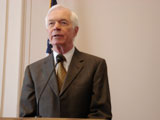
The Delta Caucus would like to pay tribute to the late, great U.S. Sen. Thad Cochran of Mississippi, a powerful force in the US Senate for decades and a champion for the Delta. Sen. Cochran passed away on May 30, 2019. He spoke to the Delta Caucus on many occasions over the years (he is pictured above speaking to a Caucus event on Capitol Hill in Washington, DC) and his thoughtful, courteous and bipartisan leadership will be sorely missed.
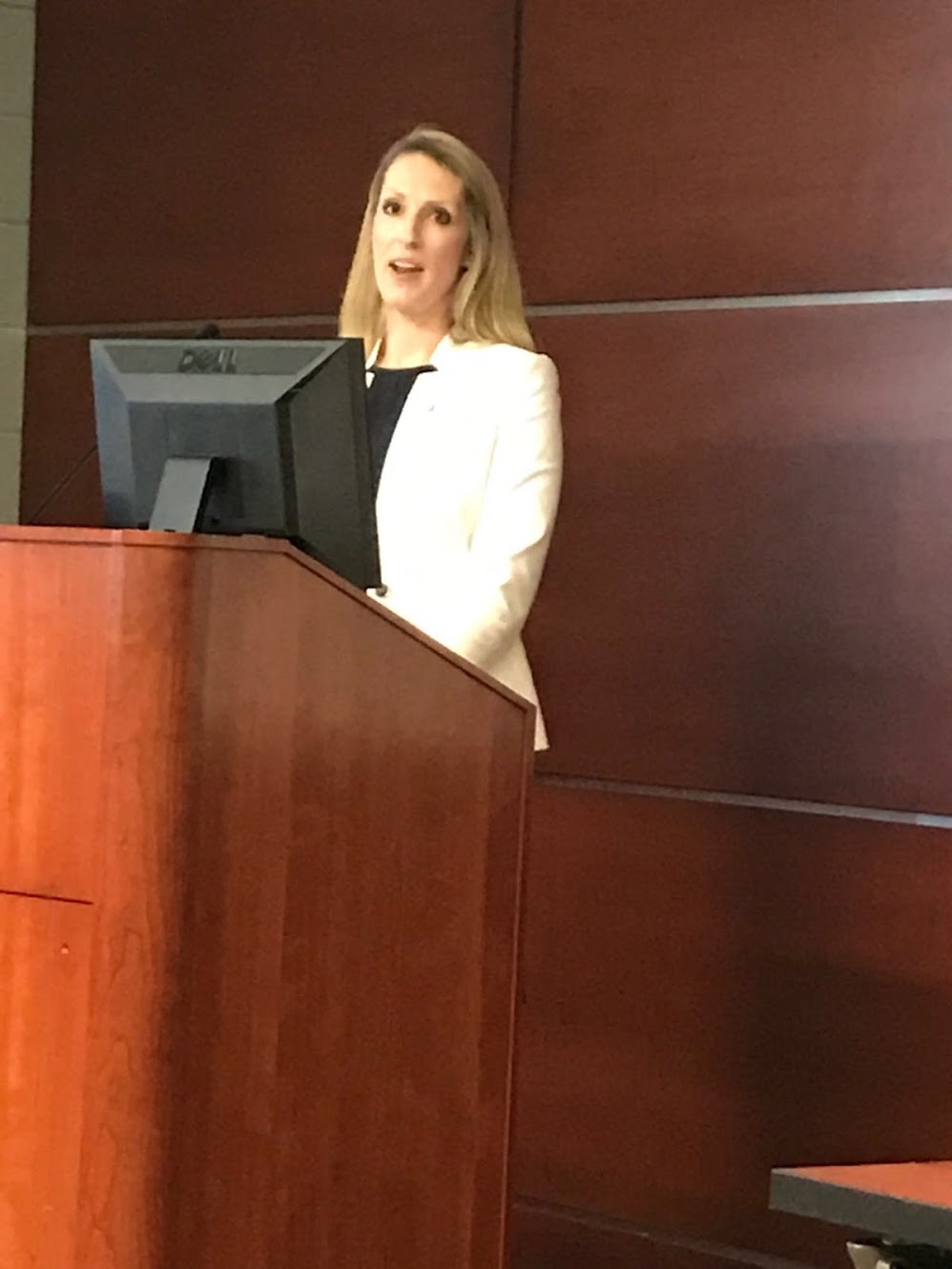
Marcie Lawson, Executive Director, Sikeston, Missouri Regional Chamber and Area Economic Development Corporation, speaking at the Delta regional conference in West Memphis, Arkansas on April 26, 2019.
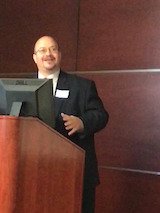
Alan Gumbel, Greater Memphis Alliance for a Competitive Workforce, Memphis, Tennessee, speaking at the Delta regional conference in West Memphis, Arkansas on April 26, 2019.
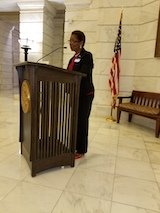
Mayor Shirley Washington of Pine Bluff, AR, speaking to the Delta Caucus at the Arkansas Capitol Rotunda in 2017.
Caucus Director's Email Out of Service (Temporarily, we hope); & Mark Twain quote
Posted on April 18, 2024 at 03:09 PM
Technical note and comic relief: Caucus Director Lee Powell’s MicroSoft Outlook email is out of service. We hope this is temporary, but since Mr. Powell has the technological expertise of an oyster, the issue is still in doubt.
The unfortunate Mr. Powell clumsily pushed the wrong button and was ejected from MicroSoft Outlook, and he can’t get back in because he forgot his password. He has not been able to reach MicroSoft for a new password because he has been placed on hold for over an hour each time he has called over three days, and then disconnected.
(On the plus side, he has memorized the Muzak melodies they play while on hold.)
We have not been able to get through the cumbersome process for getting the password from the website.
They have a tutorial explaining how to use the website that lasts almost an hour, but I couldn’t understand it and started to get drowsy after 20 minutes on there.
If anybody needs to get in touch with LP, right now the only way is by phone at 202-360-6347.
Mark Twain’s advice on how to deal with a situation where you have choices that are both bad is the following:
“If it’s your job to eat a frog, eat him first thing in the morning.
If it’s your job to eat two frogs, eat the bigger one first.”
I have been pondering long and hard over how Mr. Twain’s advice can help me in my current dilemma. I guess he is too deep a thinker for me because I can’t figure it out.
I guess I’ll just have to keep trying. Surely I will reach MicroSoft before the May 30-31 Delta Caucus meeting by Zoom. Thanks–Lee Powell, Delta Caucus
Delta Caucus May 30-31, 2024 Meeting Will Be by Zoom and Not In-Person in LR
Posted on April 10, 2024 at 12:50 PM
Delta Caucus Meeting on May 30-31, 2024 Will Be by Zoom
April 10, 2024
We have changed the format of the May 30-31, 2024 meeting to a Zoom meeting to enable more participation from people who live a long distance from Little Rock and to reduce the time and expense of travel.
You register and RSVP by paying the registration fees–that information is below in this message.
The Zoom meeting is just as important as an in-person meeting and we will continue working hard to get as strong a turnout as possible.
There is a trend nowadays toward Zoom meetings and away from in-person meetings and we have to deal with that reality.
The meeting will only be by Zoom and of course we are cancelling the meeting space and group hotel bloc in Little Rock.
The key issues will be job creation, infrastructure, health care, hunger and nutrition, Delta Heritage tourism, education/workforce development, transportation and related regional development subjects.
We have 35 RSVPs as of now, have many other invitations sent out, and will keep working to increase that number until May 30.
SCHEDULE
The opening session will be the evening of May 30, 2024, Thursday, about 5:30 p.m. to 7:15 p.m.
The Friday session May 31, 2024 will be from about 8:45 a.m. to about 12:30 p.m.
REGISTRATION
You register by paying the registration fees,
The early registration fee of $75 is good until May 1, 2024 to provide an incentive to get the registration fees in before the time of the conference.
After May 1 and up to May 31 the registration fees go up to $100. We would request that people NOT wait until the time of the conference to pay registration fees because it takes up time to collect them while we are trying to get the program started.
The fastest and easiest way to register is to go on the website at mdgc.us and go to the PayPal link that says “Donate.”
If you prefer to pay by check, please make out the check to “Delta Caucus” and mail to:
Delta Caucus
5030 Purslane Place
Waldorf Md 20601
We would greatly prefer to not have to collect registration fees after the conference is over, so the fees go up to $125 each if we have to collect them at that late time.
Group discount: We will offer a group discount of $50 each for a group of three or more, and a discount down to $30 each for a group of five or more.
Thanks again for all your support of the Delta regional advocacy initiative over the years. Lee Powell, Director, Delta Grassroots Caucus (202) 360-6347
Please Register for Delta Caucus Conference in Little Rock on May 30-31, 2024
Posted on March 22, 2024 at 12:02 PM
Please register by paying the registration fees for the Delta Caucus spring conference in Little Rock on May 30-31, 2024. You register by paying the registration fees.
You can pay the registration fees at the website on mdgc.us by going to the PayPal link that says “Donate,” or pay by check to the address listed below.
You can reserve a room at the Comfort Inn Presidential for the night of May 30 by calling the sales manager Sierra Logan at (501) 297-9005.
Early registration fees of $75 until April 30 for an individual will save you money and help expedite matters for the group as a whole. For a group of three or more you will get a discounted rate to $50 each and $30 for a group of five or more.
NEWSLETTER TABLE OF CONTENTS
Schedule
Registration fees
Group hotel
SCHEDULE
Opening Session:
Thursday, May 30–Speakers from 5:30 p.m. to 7:30 p.m., followed by a networking dinner on your own at the Dean-MacArthur meeting room at Comfort Inn Presidential in Little Rock, Arkansas from about 7:30 p.m. to about 8:30 p.m. at hotel restaurant near the meeting room
Friday, May 31 session:
Clinton Library Great Hall from 8:45 a.m. to lunch from noon to 1 p.m., May 31, 2024.
REGISTRATION FEES
Early registration fees will be discounted to $75 each if received by the early registration deadline of April 30, 2024.
Registration fees go up to $100 from May 1, 2024 to May 30-31, 2024.
We discourage people from paying at the front desk at the time of the conference, because this leads to bottlenecks and detracts from a full focus on getting the conference underway.
LATE REGISTRATION FEES–For those who pay after the conference is over, registration fees increase to $125 as an incentive to get the registration fees in on time.
The fastest and easiest way to pay the registration fees is to go to the website at mdgc.us and go to the PayPal link that says “Donate.”
If you prefer to pay by check, please make the check out to “Delta Caucus” and mail to:
Delta Caucus
5030 Purslane Place
Waldorf, MD 20601
While the great majority of people pay the registration fees, some do not and recently we had an unusually large number who either did not pay the fees on time or still have not paid them. For those who ignore or refuse the obligation to pay the fees, they will not be able to attend Delta Caucus events.
The Delta Caucus is a volunteer, private sector group and this is by invitation only.
GROUP HOTEL
The group hotel is the Comfort Inn & Suites Presidential in Little Rock.
You can make the reservation to get the lower group rate of $129 by calling the Comfort Inn sales manager, Sierra Logan, at (501) 297-9005 and saying you are with the Delta Caucus group.
The address is Comfort Inn Presidential
707 Interstate 30
Little Rock, AR 72202
Debi Alexander Honored by Inclusion in Marquis' Who's Who; She is the Wife of former US Rep. Bill Alexander
Posted on March 21, 2024 at 05:59 PM
Debi Alexander, Wife of former U.S. Rep. Bill Alexander, Included in Marquis Who’s Who for Work to Help Adults with Disabilities
We would like to inform our partners across the 8-state Greater Delta that Debi Alexander, wife of the Hon. Bill Alexander who served as US Representative for the First District of AR, has been included in the prestigious Marquis Who’s Who for her service in helping adults with disabilities.
Most of our partners will vividly remember Debi Alexander as a dynamic, thoughtful leader who was active across the First District in helping Congressman Alexander in his work promoting community and economic progress in the Greater Delta. Bill Alexander served the First District for 24 years and Debi was by his side with her vivacious leadership across our region.
We believe in recognizing partners in our network when they have received acclaim, and here is the statement from Who’s Who honoring Debi:
RESTON, VA, 2024 /24-7PressRelease/ – Debi D. Alexander has been included in Marquis Who’s Who. As in all Marquis Who’s Who biographical volumes, individuals profiled are selected on the basis of current reference value. Factors such as position, noteworthy accomplishments, visibility, and prominence in a field are all taken into account during the selection process.
Ms. Alexander is noted for her leadership expertise as the executive director at Specially Adapted Resource Clubs (SPARC), a respected organization based in Reston, Virginia, that provides exceptional community-based day programs for adults with disabilities. With five locations throughout Northern Virginia, SPARC strives to maintain a safe, caring, and inclusive environment where these young adults with severe disabilities can thrive. SPARC also maintains a public-private partnership with Fairfax County, Virginia, offering an alternative to the traditional Medicaid model.
Passionate about advocating for those who often go unseen, Ms. Alexander is eager to continue helping expand SPARC into Loudoun County, Prince William County, and along the Route One corridor. She is confident she can secure the necessary funding to see it through.
Before joining SPARC in 2020, Ms. Alexander was the director of development and communications at PHILLIPS Programs for Children and Families from 2015 to 2020, a private, nonprofit organization founded over 50 years ago that serves over 500 children and their families annually throughout the Washington metropolitan area.
She also worked as an executive director for the Rainbow Therapeutic Riding Center between 2006 and 2015. During an earlier stage of her career, Ms. Alexander worked in public relations and marketing with the Fairfax County Office of Partnerships and as the director of presidential letters and messages at The White House.
In addition to her full-time career endeavors, Ms. Alexander has lent her expertise to the board of directors for Northern Virginia Community College and joined the NOVA Foundation as a member of the board of directors and communications chair. Civically invested, Ms. Alexander presently serves in various roles with the Greater Reston Chamber of Commerce, the American Association of University Women, and, among other organizations, Serve Our Willing Warriors.
Ms. Alexander graduated from George Mason University in 1994 with a Doctor of Jurisprudence. She also completed leadership training at the Leadership Fairfax Institute in 2017.
Highlighting her achievements, Ms. Alexander was one of six to be recognized by Northern Virginia Magazine as a Northern Virginian of the Year in 2013.
About Marquis Who’s Who®: Since 1899, when A. N. Marquis printed the First Edition of Who’s Who in America®, Marquis Who’s Who® has chronicled the lives of the most accomplished individuals and innovators from every significant field of endeavor, including politics, business, medicine, law, education, art, religion and entertainment. Marquis celebrates its 125th anniversary in 2023, and Who’s Who in America® remains an essential biographical source for thousands of researchers, journalists, librarians and executive search firms around the world. Marquis® publications may be visited at the official Marquis Who’s Who® website at www.marquiswhoswho.com
Summary of Efforts to Address the Delta's Regional Development, 1990s to the Present
Posted on March 19, 2024 at 02:36 PM
“A Short Summary of Efforts to address community and economic development in the Delta, 1990s to the Present”
News of the closing of the iconic First Baptist Church in Helena has prompted a great deal of comments regarding the Greater Delta Region in general. This is one of the grand old beautiful churches of the South and we are saddened to hear of its closing.
Former DRA Alternate Federal Co-Chair Rex Nelson made a statement on Facebook that it was sad that the great First Baptist Church of Helena was closing, and this was an example of population loss in the region. Nelson’s comment was factual, but some other comments on Facebook were derogatory concerning the efforts to improve the region over the past three decades.
The naysayers who bash those who are working to help the region are part of the problem, and they should join the effort for progress rather than dismissing our efforts.
In particular, we believe the statement on Facebook that “nothing ever came” of the Clinton administration’s Delta regional initiative after one press conference in 1999 is totally erroneous.
Caucus Director Lee Powell was among the Presidential appointees in the Clinton administration who worked for a strong focus on the Delta—always recognizing that we should not make unrealistic promises, given the 200 years of melancholy legacy in slavery, Jim Crow and the mistaken policy of attracting big plants with cheap labor that soon left for even cheaper markets elsewhere.
There were some accomplishments in spite of the difficulties both in the Clinton administration and later years, however, so it is not all gloom and doom.
The policies of the Clinton administration were geared to helping middle class to lower-income families, of which we have many in the Delta, so that was constructive for the Delta. A diversified policy of generating many small to medium-sized businesses and broad-based economic growth is far wiser than the outdated policies.
Status-quo oriented forces opposed our efforts, but the administration’s Delta Regional Initiative gained momentum from about 1995 onward and eventually led to the most intensive focus on the Delta of any Presidential administration in history by 1998-2000.
We know the results were limited but we had the fortitude to make the effort—and many people warned us not even to try because the problems were so immense.
Kevin Smith, former mayor of Helena, aide to the late US Sen. Dale Bumpers, and long-time Delta advocate, cites two recent examples of constructive projects in Helena based on initiatives begun in the Clinton era–DRA and New Markets Tax Credit:
–The Delta Regional Authority provided funding to Helm Fertilizer for a paved road to their Helena slackwater harbor site that will add 50 jobs;
–In 2022, Poinsett Grain and Seed (which located at Helena in 2020) received New Markets Tax Credit funding to expand their site, helping their constructive activities related to barge traffic and shipping grain.
Smith acknowledged that they have significant population loss (population is now approximately a little under 10,000) and does not deny the difficult issues his area faces, but he also stressed that “There have been some good, constructive projects done here along with the challenges we face, and those have not been accurately portrayed or discussed.”
This is a relatively short summary we present here–A comprehensive survey would take a report along the lines of the Clinton administration’s Delta Report, which is available on the Delta Caucus website at mdgc.us at the link that says “Delta Vision, Delta Voices.” This was nonpartisan and included many contributions from Republicans, Independents and Democrats.
Some quick facts on the Delta: Here is a short list of some key facts about efforts to support community and economic development in the Delta over the years:
The Clinton administration, the later Delta Grassroots Caucus from the early 2000s and other advocates never claimed we were going to suddenly bring about prosperity in a region that has had serious economic problems after 200 years of counterproductive policies. I know how serious the problems are, seeing them in my work every day.
As one of the three managers for the administration’s Delta Regional Initiative (I was based at USDA; the others were Wilson Golden of Mississippi and the late Al Eisenberg at US DOT), we said we would fight hard against poverty in our region but never promised a quick, magical turn-around, always being realistic enough about how severe the problems are.
2) During the Clinton administration, economic indicators DID improve—unemployment was 7.5% in 1993 for the region and declined to 4.5% by 2000, and poverty levels were reduced by 10% from 1996 to 2001. The indicators were at least headed in the right direction, although the issues remained very challenging. Clinton (or any President) can’t be held responsible for what happened later, but the record on his watch was solid.
3) The Delta Regional Authority was created in 2000, after naysayers and defenders of the status quo had blocked it for many years. From a low of $5 million in the early 2000s, we have fought to increase its budget by 6 times to today’s DRA budget of $30 million, and we will work to get it much bigger to the best of our ability.
The regional economic indicators declined again in the Bush years—partly due to national and international economic trends, partly due to lessened federal emphasis on the region, but Clinton can’t be responsible for what happened under later administrations, although the Delta Caucus and others have continued to work on these issues, sometimes with disappointing results, sometimes with limited progress.
The DRA did continue during the Bush administration with Alternate Federal Co-Chair Rex Nelson and others doing a lot of good, hard work and that is to the Bush administration’s credit. We all know that much more needs to be done.
Mike Marshall of Missouri followed up with more diligent and effective work as DRA Alternate Federal Co-Chair in the Obama administration. Current DRA officials are duly carrying on in that constructive tradition.
An individual named Chuck Martin whom we do not know stated that Clinton gave a speech in 1999 about revitalizing the Delta and that was most or all he did and “nothing ever came of it,” but in fact the administration held a series of listening sessions all up and down the Delta and passed legislation based on the recommendations, including the bill creating the Delta Regional Authority that was signed into law in late 2000, after encountering resistance from status-quo forces in the region and without.
We make no claim that the DRA is a panacea for all the Delta’s problems. But it does constructive work every year: for example, in FY 2022, DRA and leveraged funds led to;
–$46 million investments in the Delta,
–with 1,841 jobs created or retained,
–1,228 people in training programs, and
–41,878 families affected. This is not a huge impact, but it is real and constructive.
The DRA has operated for over two decades now and they continue to turn out these constructive projects year after year.
4) There were innovations from the beginning of the Clinton administration in 1993 including Enterprise Communities and Empowerment Zones, in later administrations Renewal Communities and related innovations regarding community planning and local collaborations to promote community and economic development.
As one example, one fourth of all the Empowerment Zones and Enterprise Communities across the country were located in the Delta in 1993 in the first round of EZ/EC and additional Delta organizations were set up in a later round. Many of them still operate.
Infrastructure: There were many infrastructure projects in transportation, housing, water and sewer, and other fields in the Clinton years and afterward. There are so many of these it would take a tome to list all of them, but here are a few highlights and for those who want to look at it in depth you can go on the website at mdgc.us and go to the link that says “Delta Vision, Delta Voices,” at the top of the site and then go to the link in the table of contents that says “Infrastructure.”
At USDA Rural Development, where I served as senior adviser to the Under Secretary, there was an expansion in these programs during the Clinton administration:
–Telephone service was provided for the first time to 8,200 rural, primarily low-income residents;
–77,000 Delta residents received improved telecommunications;
–$9.8 million was invested to provide distance learning and telemedicine for 800,000 residents in the region.
–The Departments of Commerce, Energy, DOT, EPA and HUD provided expanded rural water projects, energy supply and delivery and solid waste management.
5) Health care and nutrition: There was an expansion of Food Stamps use and the Women, Infants and Children (WIC) program, and the five Delta states (Arkansas, Mississippi, Missouri, Kentucky and Illinois) joined the WIC Farmers’ Market Nutrition Program in the 1990s.
State Children’s Health Insurance Program (SCHIP), Centers for Disease Control, and USDA Rural Development Community Facilities health care activities were expanded in recognition of the serious health care and hunger and nutrition issues related to the Delta’s high rates of obesity, diabetes, heart disease, and other maladies.
Other leaders and organizations have followed up since then. Of course there are many critics as well as supporters of Obamacare in general, but there is no question it did help some lower-income people in the Delta.
Back to the top